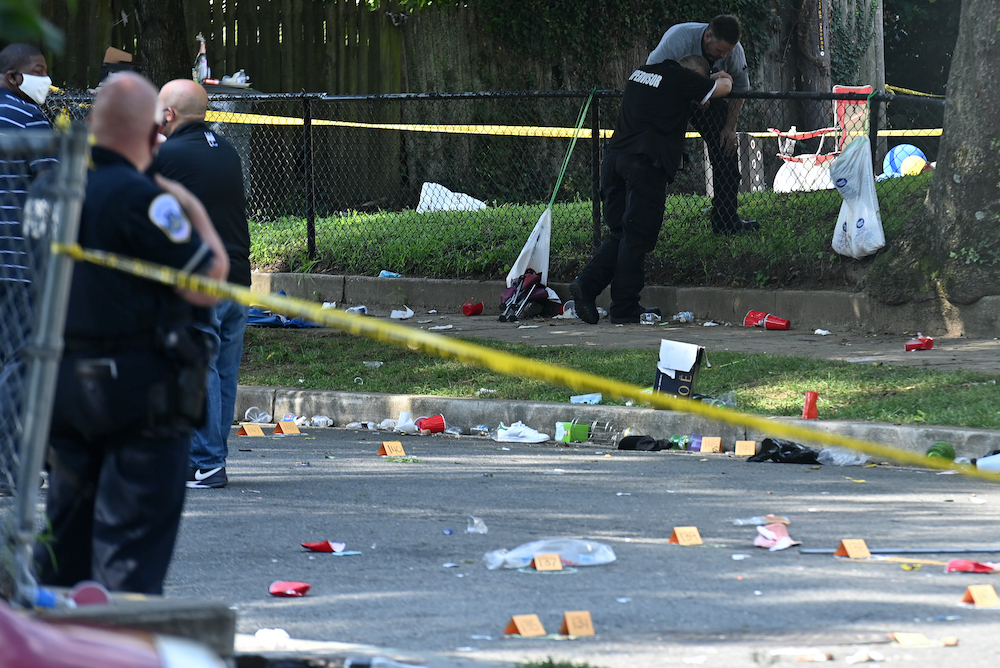What To Know This Week
“The minimum requirement:” Congressman urges colleagues to condemn extremism. In a forum hosted by The Atlantic Council’s Digital Forensic Research Lab, Democratic Representative Tom Malinowski of New Jersey discussed being in the Capitol on the day of the attack and facing death threats after authoring a resolution last fall condemning the QAnon movement. His entreaty: “The minimum requirement right now of membership in a respectable governing body in this country is consistent condemnation of groups like QAnon, and the Proud Boys, and the boogaloo boys, and the Three Percenters, and the Oath Keepers, and all of these violent extremist groups that have unfortunately gotten a foothold within one of our major political parties.”
- From the archives: “What kind of person calls a mass shooting a hoax?” It’s question we explored three years after Sandy Hook, in a story that feels newly relevant amid the discoveries of Representative Marjorie Taylor Greene’s past support for mass shooting deniers and her harassment of a Parkland school shooting survivor.
A man obsessed with election conspiracy theories was arrested near the Capitol with guns and ammo. Capitol police on Wednesday detained the 71-year-old West Virginia man a few hundred feet from Rayburn House Office Building and charged him with possession of unregistered ammunition and unlawful possession of a gun. In addition to a pistol and 20 rounds of ammunition, he had a list of U.S. senators and representatives, according to a police affidavit obtained by The Daily Beast. The man’s social media history indicated an affinity for the QAnon conspiracy theory, which has convinced some followers that the 2020 election was stolen. Warnings manifested: The arrest came the same day a Department of Homeland Security alert re-upped official concerns regarding the risk of extremist violence fanned by election misinformation and just days after another heavily armed man was arrested near the White House. Related: A Colorado man affiliated with the Three Percenters was formally indicted on six felony counts for his role in the insurrection.
Washington D.C. has a director of gun violence prevention for the first time. The position was created as part of the city council’s decision last year to divert $15 million from the district’s police department — much of it toward alternative community safety strategies. The District is the latest major metro to consolidate and coordinate public health-informed intervention efforts through a centralized office. In D.C., the appointment of Linda Harllee Harper to the new post comes at a critical time: Homicides in the capital city reached a 16-year high last year.
A financial regulator halts a rule that could force banks to loan to gun companies. The last-minute Trump administration move would have barred banks from considering reputational risks or the broader societal consequences of their products when evaluating clients. Gun violence prevention groups joined banking industry lobbies in opposing the change. The Office of the Comptroller of the Currency finalized the rule on January 14, but the agency never published it in the Federal Register, a step required for new regulations to go into effect. The current acting comptroller, who assumed the role just after the rule was finalized, now says the OCC will punt a decision on the rule’s final status to President Biden’s nominee to head the agency. — Chip Brownlee, investigative fellow
Democrats introduce bill to ban gun carrying by members of Congress. Representative Jared Huffman filed the No Congressional Gun Loophole Act with the support of more than 30 Democratic sponsors, picking up on a failed effort he led in 2018. As we reported, a 1967 law bans civilians from carrying guns on Capitol Hill, even if they have concealed carry licenses. But lawmakers are exempted and may keep firearms in their offices. That doesn’t extend to the House chambers, where guns are banned for legislators and metal detectors were installed after the Capitol insurrection.
Data Point
At least 100 — the number of armed demonstrations in state capitals since May of last year. [Armed Conflict Location & Event Data Project and the Bridging Divides Initiative]

